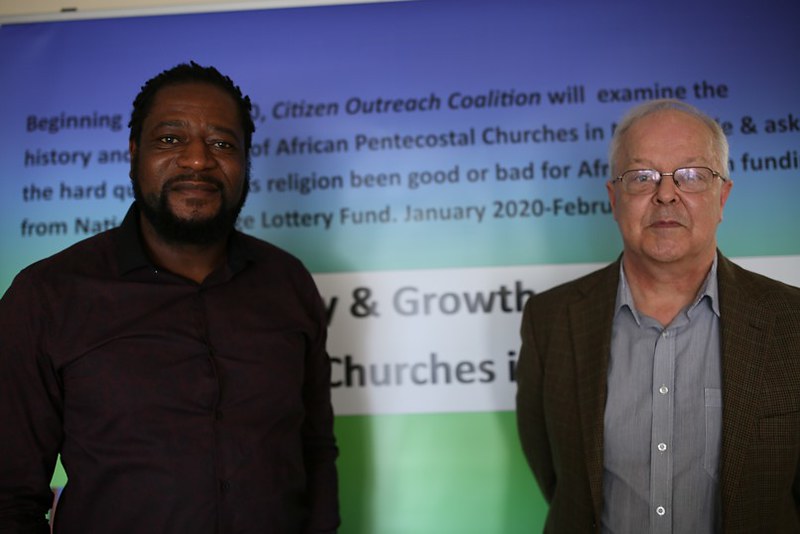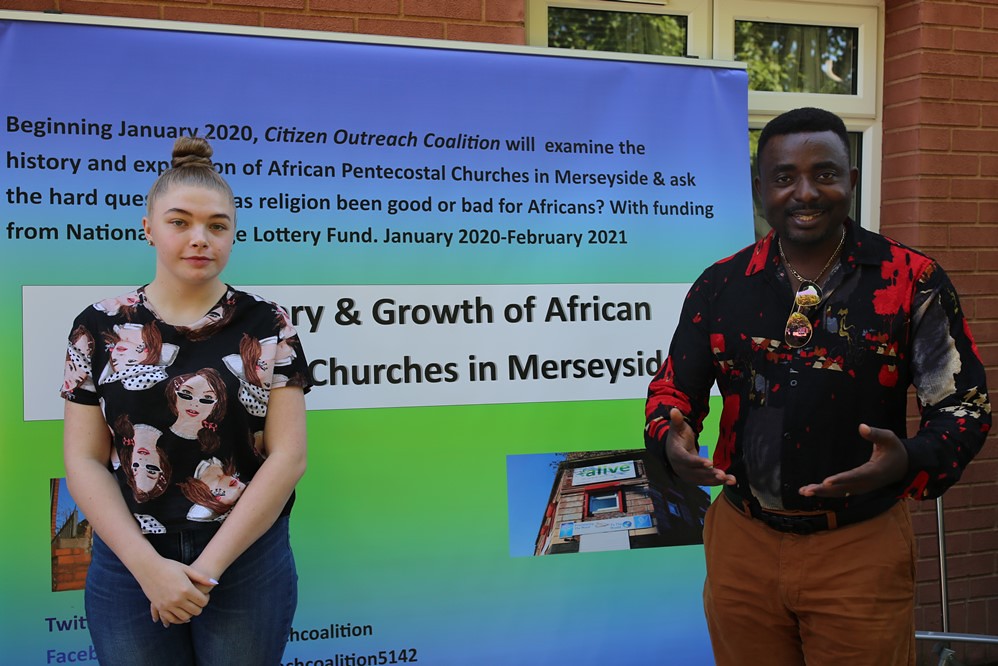Whether in Africa or when they travel abroad, a large number of Africans are deeply religious. They go to church regularly-sometimes four times a week, pray fervently and still belief life without God or a guiding spirit is fruitless. Africans across the UK like those in the USA or anywhere else across the globe still manage to build their lives, careers, extracurricular activities (from birth to death) around their church congregations-thereby making religion a centre stage of their existence. Knowing how they depend on religion, a good number of “Men of God” have created thousands of Pentecostal churches to help Africans at home and abroad in their search for God and salvation. Most of the churches they create sometimes as one man or close family run churches are Pentecostal in nature. They centre their beliefs around the everlasting presence of the Holy Spirit, miracles healings and prosperity preaching.
With a grant from The National Lottery Heritage Fund, Liverpool based charity Citizen Outreach Coalition is half way through a multimedia oral history project titled “The History & Growth of African Pentecostal churches across Merseyside”. With the help of trained volunteers, we have been interviewing a wide range of people including pastors, church goers, a researcher and young people on what they perceive Pentecostalism to be, their relationship with the church, their journey through religion and their unshakeable faith in an all powerful God. However, we have also looked at the dark side of African Pentecostalism from the fake miracles, deceptions, embezzlement and some of the really dark sides of African religious practices. Below are short excerpts from some of the interviews we have so far done
Dr Richard Burgess. Researcher.
Dr Richard Burgess, a researcher and lecturer at the London University of Roehampton. He spent 17 years in Nigeria researching Pentecostal churches and now lectures Theology in the university. He has written books on Pentecostalism
He spoke to Volunteer Vitalis Tanteh. Excerpts
Vitalis. What do you think about claims some Pentecostal Pastors perform fake miracles?
Dr Burgess. If there is such a thing as a fake miracle, it means there are real miracles as well. I don’t know if you have heard of the film the good, the bad and the ugly?
Vitalis. Yes
Dr Burgess. I will say that sums up the pentecostal movement. There is the good, I have seen and talked about some of the good-the good work churches are doing in society using some of the money raised through tithering or whatever for the common good. There is the ugly which I am neutral about- I don’t particularly like; maybe that is cultural. There are things I don’t particularly like but I see them as neutral. Then there is the bad. I think there are certainly pastors who are using this to manipulate and to grow rich at the expense of their poor members. In terms of miracles, I’d certainly heard stories, I can’t; I hesitate to criticize in the sense that I wasn’t there but I have certainly heard stories of fake miracles where they are using this to manipulate the people. It is often accompanied by appeals for money. The love of money is the root of all evil. I think money is kind of neutral but it has its use. I think there are pastors, not just pentecostal pastors, not just African pentecostal pastors; there are Anglican ministers, there are Baptist ministers, there are Latin American, American, British ministers who are using miracles or using tithering for their own benefit rather than the common good.
Pastor Oluwale Oridupa
Nigerian born Pastor Oluwale Oridupa (Pastor Olu) of one of the branches of The Redeemed Christian church of God answers questions from young inquisitive volunteer Simon Ngwa
Simon Ngwa. What will you say about pastors who perform fake miracles, misuse money and get members of their congregation pregnant? Who holds them accountable for that?
Pastor Olu. In the UK concerning abuse, there is safeguarding. With the Redeemed Christian Church of God, you can’t be a pastor without doing a DBS. You have to do a DBS. You have to make sure that DBS is security check to check that people have not abused anyone in the past. Your record is there and they will be checking it every year to make sure that you can still do a job that deals with vulnerable people…We have those regulations in place. Churches have bodies’, they have their own local bodies that deal with cases like that internally.
In terms of fake miracles, I don’t really know about it. I think everything has to be genuine because whoever is doing anything fake, God will still deal with the person. It might not be now but sometimes the judgement of God might take time.
Simon Ngwa. Do you personally believe in miracles? Have you performed one or seen one performed?
Pastor Olu. It is God that performs miracles. God just use us as instruments. I have experienced miracles myself. I have prayed for people that have been healed…
Michael Likambi Ngando. Evangelist
Michael attends one of the most vibrant pentecostal churches in Liverpool. In this excerpt from an interview with volunteer Chloe Grierson, he has a strong word for people who don’t go to church and do not believe in God.
Chloe. We live in the western world where most people don’t believe in religion. What will you say to them?
Michael. I have a very few lines of evangelism that I use with people who are completely aesthetic. Sometimes when I have a conversation with them, this is what happens. I say it is very difficult to live without God in this world. You might not belief in him, but there are things existentially that you cannot deny.
You cannot deny that life has meaning
You cannot deny that life has purpose
You cannot deny that we need morality, absolute morals for live and lets live
You cannot deny the fact that the question of dead is not haunting any philosophy out there
I start by this question; You say you don’t belief in God, please tell me this; how do you define something to be ethically right or wrong?…





Religion, money and women are the three causes of evil on earth. It’s a shame.